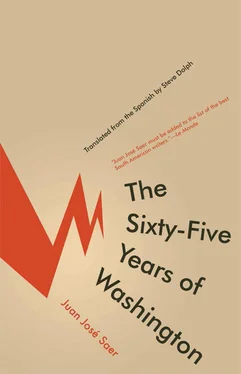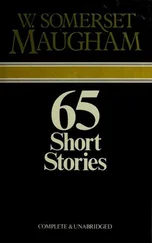Juan José Saer - The Sixty-Five Years of Washington
Здесь есть возможность читать онлайн «Juan José Saer - The Sixty-Five Years of Washington» весь текст электронной книги совершенно бесплатно (целиком полную версию без сокращений). В некоторых случаях можно слушать аудио, скачать через торрент в формате fb2 и присутствует краткое содержание. Год выпуска: 2010, Издательство: Open Letter, Жанр: Современная проза, на английском языке. Описание произведения, (предисловие) а так же отзывы посетителей доступны на портале библиотеки ЛибКат.
- Название:The Sixty-Five Years of Washington
- Автор:
- Издательство:Open Letter
- Жанр:
- Год:2010
- ISBN:нет данных
- Рейтинг книги:3 / 5. Голосов: 1
-
Избранное:Добавить в избранное
- Отзывы:
-
Ваша оценка:
- 60
- 1
- 2
- 3
- 4
- 5
The Sixty-Five Years of Washington: краткое содержание, описание и аннотация
Предлагаем к чтению аннотацию, описание, краткое содержание или предисловие (зависит от того, что написал сам автор книги «The Sixty-Five Years of Washington»). Если вы не нашли необходимую информацию о книге — напишите в комментариях, мы постараемся отыскать её.
The Sixty-Five Years of Washington — читать онлайн бесплатно полную книгу (весь текст) целиком
Ниже представлен текст книги, разбитый по страницам. Система сохранения места последней прочитанной страницы, позволяет с удобством читать онлайн бесплатно книгу «The Sixty-Five Years of Washington», без необходимости каждый раз заново искать на чём Вы остановились. Поставьте закладку, и сможете в любой момент перейти на страницу, на которой закончили чтение.
Интервал:
Закладка:
The man, maybe because the smell of the food had reached him, or because the usual time for dinner was approaching, or because hearing Isabel humming in the kitchen he understood that the routine of the house was operational again after their fight that afternoon, was standing in front of the table, organizing his tools, the way he would whenever he left the workshop, even if it was only to eat and go right back half an hour later. One glance was enough for Leto to see that everything was in its right place again and that not the slightest trace of what had happened remained. Serious and pleasant, the man, hearing him come in, offered a quick look of consent, but during the momentary distraction that the look caused him, his fingers, searching the surface of the table near where it met the wall, touched something so unexpected, intense, and brutal that the arm drew back and his whole body, contracted and rigid, jumped or was sucked backward, while the man, with a pained look, rubbed the hand and arm that had just retracted. Leto was too familiar with the man’s occupation to not realize that he’d received an electrical jolt, shock therapy , they called it, but the surprise of witnessing the manifestation of something they had terrorized him with ever since he could toddle gave way to astonishment, to panic almost, before the unexpected reaction from the man who, after recovering from the surprise, took on a strange, malevolent smile and, still rubbing his arm, started to speak, to talk to the invisible force that had shaken him, to converse almost, in a tender but at the same time ironic and defiant tone, not without malice, the way he might have talked to a living thing, a puppy or a person whose intimacy was problematic. Ironic, with hate-laced affection, the man chatted, reproachfully, with the unseen. Leto approached the table and leaned toward the wall where, standing on his toes, he was able to see the end of a cable, made of naked threads of twisted copper wire that the man started to push back, to duel almost, like an excited dog, with the end of his index finger, which he drew near and withdrew from carefully but daringly, to test its intensity, the limits of its force, of its territory — invisible and vigilant — you could almost say, and several times he was forced to pull back quickly, but not needing to stop smiling or talking to it, in a constant and playful whisper, intense and familiar, an exclusive and morbidly authentic treatment that — and Leto was sure about this — the man did not provide anyone else in the world.
The Mathematician, meanwhile, seems to have calmed down. As they continued down the middle of the street, incrementally weaker traces of his agitated silence were reaching Leto. Tomatis’s attitude, after generating skepticism and even a kind of confused and agitated brooding in him — in the Mathematician, no? — as they separated, when Tomatis showed what they call an open display of hostility, has instead transformed, in fact, into a somewhat charitable psychological evaluation, a resignation that induces him to minimize the arbitrary in Tomatis’s behavior and attribute it to a passing moral failure of which Tomatis is more victim than perpetrator. In fact, he had to suppress the momentary waves of The Incident which, rising from the darkness, appeared several times during the debate he has been having with himself. He has had to suppress them, it’s true, but they were suppressed. And so, breathing deeply, and noticing that Leto, who is walking next to him in silence, apparently overwhelmed by Tomatis’s insolence, also seems to emerge from his thoughts prepared to continue the conversation, the Mathematician lifts his head, contented, and straightening himself a little, looks with euphoria or resolve at the straight and bright street extending before him. He sees it sharp, clear, living — he wonders if, submerged in psychological trifles, he has been missing the best things. His attenuated enthusiasm, modifying even the rhythm of his stride, reaches as far as Leto who, almost simultaneously, comes out of his self-absorption and senses that the fact of being there, in the present and not in the swamp of memory — though he does not ignore that the extinct endures in the material, in the bones and the blood — of being there, in the morning sun, produces a shiver of pleasure and a startling sense of liberation. Not such clowns ultimately , he thinks and lifts his gaze, meeting, for a prolonged moment, the Mathematician’s eyes, which are open and radiant. The incidental Tomatis, a soft and dark mass that polluted the morning with its sticky splatters, disintegrates into the past — both time and place, matter interlaced with breath or fluid or whatever — which the translucent but harsh succession of experience, unfathomably ineluctable, deals out and discards — discards, no? — or drops, into an abyss, out there, into what is, by definition, inaccessible, and about which Leto and the Mathematician, in unison — if you’ll allow the expression — and without any kind of words, think, it’s not worth worrying, just now at least, when a whim of chance, a setback becoming a boon, a stringing of the disperse globs of the visible and the invisible, of the ambiguous clumps of the solid, the liquid, and the gaseous, of the organic and the inorganic, of waves and particles, have come together to deposit in us, in the translucent center of this morning and no other, a reconciled deliverance.
More or less. The Mathematician brings his arm up, grabbing the horn of the pipe in his hand so that the pipe stem sticks out between his middle and ring fingers, and, tracing a semicircle in the air, designates the present, which is to say the sidewalks, the street, the rows of shops, the illuminated signs, the people standing on the sidewalks or walking in different directions, the various perspective planes that stretch down the straight street, made linear by optical illusion as they extend toward the horizon, the morning light, the sound of voices, footsteps, laughter, motors, horns, the familiar smells of the city, of the heat, of the spring, the clear and incessant multiplicity which could also be, and why not, a new expression for that.
— Occurrence, he says.
Touched by a sudden loquacity, Leto responds, The philosophers’ straight flush. It was this street. This moment. So many burned or made to burn.
— To hell with them, says the Mathematician, afraid that Leto, so circumspect a few moments earlier, would fall, disappointing him, into grandiloquence. But immediately he repents: And what of it, when all’s said and done? The manner in which a truth manifests is secondary. What matters is that the truth is clear , he thinks, more or less. And then, incorrigible: Manner, exactly — it would takes years to come to terms with the terminology .
They cross the street. Without realizing it, they have accelerated a little, and looking at them you would say that they are hurrying somewhere in particular, so as to arrive on time; their rhythm and expressions translate as dexterity, facility, and ease. But they are going nowhere, in fact, and unburdened, you could say, of duties or destination, they walk inside an integral, palpable actuality that spreads through them and that they likewise disperse, a delicate and transient organization of the physical — delimiting and containing, during an unforeseen lapse, the dismaying and destructive blind drift of things. The Mathematician observes that the clarity of things sharpens and persists, not only in the whole but also in the individual details, and that the notorious reality he has heard discussed so often is ultimately nothing but this, the thing just now surrounding them, and which at the same time is, and of which he at the same time is, object and surrounding — always at the same time, as we were saying, or rather yours truly was saying, and at the Same, no? which could be called something else — place, I was saying, no? — and the Mathematician, stimulated by the persistence of his vision, thinks that he is beginning to understand everything, from the start, comprehending, in a single look transforming into thought, the shape and form of what moves, vibrates, and congeals in this translucent medium, relating each of his perceptions with such quick and strong nexuses of so much precise and universal evidence that, almost bothered by his simultaneous enjoyment and comprehension, he imparts, austere and decisive, a command: Substitute an equation for the ekstasis.
Читать дальшеИнтервал:
Закладка:
Похожие книги на «The Sixty-Five Years of Washington»
Представляем Вашему вниманию похожие книги на «The Sixty-Five Years of Washington» списком для выбора. Мы отобрали схожую по названию и смыслу литературу в надежде предоставить читателям больше вариантов отыскать новые, интересные, ещё непрочитанные произведения.
Обсуждение, отзывы о книге «The Sixty-Five Years of Washington» и просто собственные мнения читателей. Оставьте ваши комментарии, напишите, что Вы думаете о произведении, его смысле или главных героях. Укажите что конкретно понравилось, а что нет, и почему Вы так считаете.












